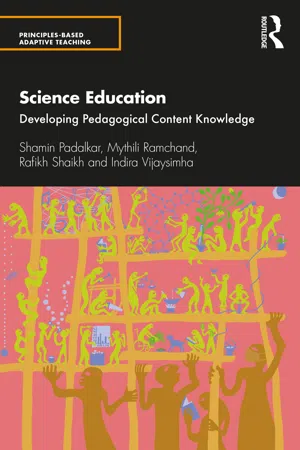
Science Education
Developing Pedagogical Content Knowledge
- 200 pages
- English
- ePUB (mobile friendly)
- Available on iOS & Android
Science Education
Developing Pedagogical Content Knowledge
About this book
The book presents key perspectives on teaching and learning science in India. It offers adaptive expertise to teachers and educators through a pedagogic content knowledge (PCK) approach. Using cases and episodes from Indian science classrooms to contextualise ideas and practices, the volume discusses the nature of science, and aspects of assessments and evaluations for both process skills and conceptual understanding of the subject. It examines the significance of science education at school level and focuses on meaningful learning and development of scientific and technological aptitude. The chapters deal with topics from physics, chemistry and biology at the middle- and secondary-school levels, and are designed to equip student-teachers with theoretical and practical knowledge abilities about science, science learning and the abilities to teach these topics along with teaching.
The book draws extensively from research on science education and teacher education and shifts away from knowledge transmission to the active process of constructivist teaching-learning practices. The authors use illustrative examples to highlight flexible planning for inclusive classrooms. Based on studies on cognitive and developmental psychology, pedagogical content knowledge of science, socio-cultural approaches to learning science, and the history and philosophy of science, the book promotes an understanding of science characterized by empirical criteria, logical arguments and sceptical reviews.
With its accessible style, examples, exercises and additional references, it will be useful for students and teachers of science, science educators, BEd and MEd programmes for education, secondary and higher secondary school teachers, curriculum designers and developers of science. It will interest research institutes, non-governmental organisations, professionals and public and private sector bodies involved in science outreach, science education and teaching and learning practices.
Tools to learn more effectively

Saving Books

Keyword Search

Annotating Text

Listen to it instead
Information
Table of contents
- Cover
- Half-Title
- Series
- Title
- Copyright
- Dedication
- Contents
- List of Figures, Tables, Boxes
- Series Editors’ Note
- Foreword
- Acknowledgements
- Abbreviations
- Introduction
- 1 Science Education: An Overview
- 2 Nature of Science
- 3 A Cognitive Approach to Learning Physics
- 4 An Inquiry-Based Approach to Learning Chemistry
- 5 A Socio-cultural Approach to Learning Biology
- 6 Assessment in Science Education
- 7 Inclusive Science Education
- Appendix: Resources and Tools for Practice
- Index
Frequently asked questions
- Essential is ideal for learners and professionals who enjoy exploring a wide range of subjects. Access the Essential Library with 800,000+ trusted titles and best-sellers across business, personal growth, and the humanities. Includes unlimited reading time and Standard Read Aloud voice.
- Complete: Perfect for advanced learners and researchers needing full, unrestricted access. Unlock 1.4M+ books across hundreds of subjects, including academic and specialized titles. The Complete Plan also includes advanced features like Premium Read Aloud and Research Assistant.
Please note we cannot support devices running on iOS 13 and Android 7 or earlier. Learn more about using the app